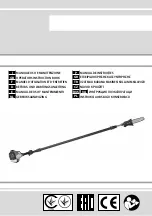
17
Blade Tension Adjustment
(Fig. 10 & 11)
a. Disconnect the saw from power source.
b. Open the upper door by rotating the upper
door knob clockwise.
c. Raise up (1) and lift the tension lever (2) on
the top of the saw, then turn it clockwise (3)
to increase the tension on the blade.
d. Turn the tension lever counter-clockwise (4)
to reduce the tension on the blade.
e. Press down the blade tension lever on the
top of the saw to engage tension.
f. With a gloved finger, pluck the back straight
edge of the saw blade like a guitar string.
Sound becomes higher pitched as tension
increases. Never increase blade tension so
tight as to completely compress the spring.
When completely compressed, the spring can
no longer act as a shock absorber.
Too much tension may cause the blade to
break. Thicker workpieces require higher
tension; maximum tension is not needed for all
cuts. Too little tension may cause the blade to
slip on the wheels.
Blade Tracking Adjustment (Fig. 12)
NOTE:
The band saw blade tracking is pre-set at the factory. Check for proper blade tension
before making any blade tracking adjustments.
Disconnect the saw from power source and open the upper door by rotating the upper door
knob clockwise. Rotate the upper wheel clockwise and check the position of the blade on the
wheel. The blade should remain in the center of the wheel.
If an adjustment is needed:
a. Loosen the tracking locknut.
If the blade moves toward the front edge of the wheel:
b. Turn the blade tracking knob slightly clockwise. At the same time, keep turning the upper
wheel until the blade is centered.
If the blade moves toward the back edge of the wheel:
c. Turn the blade tracking knob slightly counterclockwise. At the same time, keep turning the
upper wheel until the blade is centered.
d. Tighten the blade tracking locknut when you are finished making adjustments.
e. Close and lock the upper door by rotating the upper door knob counterclockwise.
f. Turn on the saw.
Fig. 11
1
2
4
3
To Decrease
Tension
To Increase
Tension
Fig. 10
















































